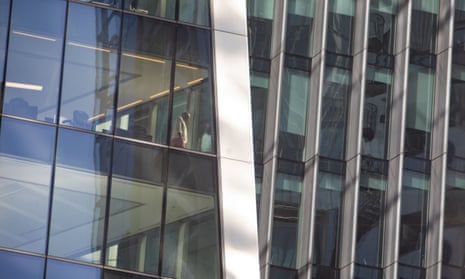One in five employees are going into the workplace for part or all of their working week despite being able to do their job from home, according to a poll from the Trades Union Congress (TUC). We spoke to people who say their employers have been breaking Covid guidance by asking them to return to offices unnecessarily. None would agree to be named publicly for fear of losing their job.
Thomas, call centre employee, Stirling
Thomas worked from home throughout the first lockdown but in September he was called back to his office. He was one of several staff who voiced concerns about spreading the virus.
“Around September they asked HR to brief us on what would happen when we went back to the office. A lot of people on these calls said they were anxious and that they didn’t want to run the risk of catching anything.”
Thomas said he and other staff tried unsuccessfully to escalate their concerns. “The HR people said line managers would need to be consulted, and then they’d need to go through the ops manager, and so on. There wasn’t a lot of transparency or accountability.”
During the current lockdown there has been an outbreak of coronavirus in the office, he said. “Two people tested positive. I know the company has procedures in place where you’re not supposed to mingle with each other and that kind of thing, but they don’t enforce it. You’re still passing people in the hallway.”
Sam, human resources employee, Manchester
Sam has been asked to come into his office more often during the current national lockdown than before. “In the first lockdown there were three or four days you’d work from home and pop in once, maybe twice a week. Now it’s a case of two days that we work from home.”
He said he could easily work from home for a full week. “My role boils down to data entry,” he said. “We can’t see a reason why we shouldn’t be allowed to work from home more.”
His employer has insisted that people remain in the office to staff the reception, he said. “They’re essentially saying, because we have that receptionist in our office, we need to have someone to answer any queries that come through. But the queries we get are 99% email-based, and if someone visits the office it is because they haven’t been able to access their emails.”
Like Thomas, Sam is worried about the number of cases of Covid staff have contracted. “We have had quite a few cases within the office and we’ve not received an email about it. It’s been a case of coming into work and just: ‘Where’s Joe Bloggs?’ ‘He’s got Covid.’ ‘Great, thank you for telling me.’ I believe there’s been four or five cases of this.
“They’ve seen that we don’t lose productivity from working from home, which I think was the main worry of employers, but they also see that they can get away with not sending us all home,” Sam said. “It’s not a case of them not letting us [work from home] at all, they just won’t expand it. It would be nice to have the option, rather than to be told just to get on with it.”
Michael, customer services, London
Michael, who works for a small energy firm, has been pressured to come into his workplace since June 2020. “As the [first] lockdown was easing, we were contacted individually asking us when we’d be back in the office,” he said.
He was worried about spreading the virus to his family. “At the time my nan was living with me for a bit because she went into hospital just before we got told to come back into work, so I delayed coming back in. My boss said to me: ‘I don’t believe your nan’s actually that ill, you’re just using her to stay at home.’ It was quite sinister really.”
When the third lockdown began, his employer told staff to remain in the office. “In January, we had a meeting the day before Boris Johnson announced it, and they [his boss] said nothing’s changing; as far as I can see we’re staying in the office.”
The safety provision is “very lax”, he said. “I’m in an office with six people, probably about a metre and half apart from one colleague who’s facing towards me, and just a desk separating us.”
Michael is classed as an essential worker as he is employed in the energy industry, but says his work could all be done remotely. “I don’t actually go out and manage any meter exchanges or actual structural stuff. It’s just taking payments and stuff like that, or dealing with complaints.
“It’s annoying because there are these big companies who are allowed to work from home, and yet we’re in the office with a quiet workload, taking the odd phone call.”
*Names have been changed.
